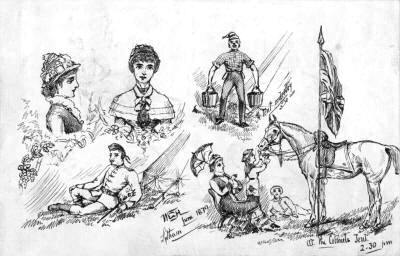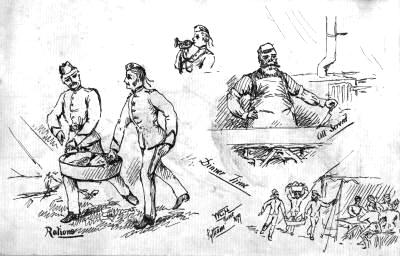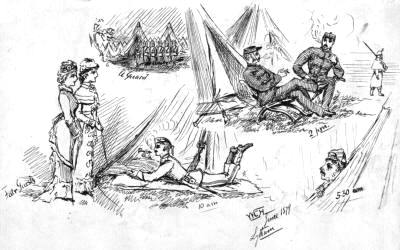Manchester & Bolton Volunteers at Lytham
Newspaper article from 1880 relating to the 1st Manchester Volunteers & Bolton Volunteers
who were in training at Lytham.
Manchester Evening News, May 1880
THE VOLUNTEER CAMPS AT LYTHAM.
FROM AN OCCASIONAL CONTRIBUTOR.
Our welcome friends, the volunteers, are again with us, and the streets of
Lytham are gay with scarlet, two battalions being now in camp here—the 1st Manchester and the
Bolton. Fatigue parties from both arrived at the latter end of last week, and by Saturday evening
the canvass towns were laid out and erected and everything ready for the occupants. I shall have a
word or two more to say about the camps by and bye.
At six o'clock a train of about fifteen carriages brought in the 1st Manchester,
and they formed in companies just outside the station, and with wonderfully little delay marched
away, under command of Col. Bridgford, by way of Queen Street, Central and East Beach, and
Station-road, accompanied by a large crowd of spectators. Remarkably well the battalion looked, the
men all being in their new scarlet, and wearing the glittering spiked helmet just adopted. Arrived
on the ground, the numbers of the respective tents were apportioned to the men, and each man was
soon busily engaged in making himself “at home" in his new quarters. Tea was then served, and the
evening was passed in strolling about the town and beach.

The Bolton battalion (27th Lancashire) arrived about seven o'clock, but their
train was drawn up at the old station, and here again a large crowd had assembled to see them
arrive. They formed up on the siding platform, and thence marched, headed by their band, to the
camp field, which was only at a short distance. The Bolton battalion is under command of Col.
Bailey. The men, most of whom have had previous camp experience, soon completed their arrangements
for the night, and then made their way into the town to spend an hour or two before nightfall.
When the Manchester (1st) and the Bolton volunteers arrived at Lytham on
Saturday last, their separate encampments were as well pitched as men could reasonably wish.

The Manchester camp is in a field just over the railway bridge, and to the right
of the road which leads from the beach ; almost, in a straight line; until it runs into
Ballam-road, a short distance on the Lytham side of the Green Drive entrance to Lytham Hall park.
The Bolton camp is a little farther north on the same road.
In a military sense the two encampments are only one. Their situation can be
briefly described. Treating them as one (and if Lytham was threatened, they must necessarily be
one), the Liggard Brook marks its northern boundary ; the road to Ballam its southern one ; Salt
Cotes and Watch Wood close it in to the east ; and the road from the beach leading through Station
Road to Ballam Road, is the boundary on the westward side. The two camps are divided by the road to
Moss Side, a strip of meadow land, and the woods, gardens, enclosures and buildings of Mythop
House. Again, looking upon the whole as one (and supposing the whole to be, as they are without
artillery), and are the defensive, to cover or hold Lytham, Mythop House is the key of the
position. But they are not one, so nothing is left for a visitor to speak of them except as
non-cohesive bodies, acting separately. So each encampment must stand or fall upon its own
merits.
The Boltonians are most snugly ensconced; they are sheltered from the cutting
east winds, which are now prevailing, by Watch Wood and the well grown plantations of Mythop House;
the Manchester people are not so fortunate in their site. The lower portion (near Liggard Brook) is
fully exposed to the biting blast ; chilly nights, and fierce sun during the day, will tell upon
them, and they will not go back to their homes pale as they came, but with a harder and more of a
campaigning bronzed complexion. As I have said the Boltonians have the most sheltered (and most
picturesque) ground, but—and that is every thing for them—the Manchester men have, incomparably,
the best drill ground. Walking round about the outskirts of the “Manchester tented field," we were
brought face to face with some iron contrivances which the controllers thereof told us were
designed to cook rations for the men. We counted the first row, and the row numbered three. They
were ovens; and a very civil kitchen-man told us that each one of those ovens could bake, nicely,
rations for 188 men in three hours—starting cold. He laid stress upon the starting cold.
As a sort of outsider of these cookers of solids, there were boilers used for
extracting the best parts of coffee and beef (the latter extract, of course, means soup.) It must
be understood that the 1st Manchester are “rationed " in the camp; not paid in money to spend as
they wish. It is difficult to come to any thing like a sound opinion on whether a body of men is
well or ill fed by a cursory view of the preparations for their meals. But, influenced by what we
saw, the Manchester men have nothing to complain of. Soldiers of the line will grumble; so,
perhaps, the 1st Manchester, wishing to be better than any regiment of the line, in all things,
grumble a little too much. Rambling on, we saw placed upon the ground, or nearly (why did they not
hoist it up), a decently sized placard ; very faintly printed in pen and ink work ; telling
everybody, whose eye it could catch, that the 1st Manchester would give an entertainment in that
tent. The placard did not say all, but an hour or two after I saw it, the bellman did; admission,
sixpence. When we were in the camp Mr. Jno. Hooper (or his representative) was in his glory. He
said, stretching up, "the officers' mess is on the field," and, taking the fact as true, the
officers might be a great deal worse of. A word about the rank and file of Manchester: There is
amongst them “no end" of “chaff," but not the slightest tinge of coarseness.
Between the 1st Manchester and the Boltonians there is a strongly marked line.
To Manchester it seems (we say it under correction) as if they thought they were sacrificing
something, and people ought to honour them. Boltonians think nothing about anything, but take
everything as it comes. Rude they are, so far as speech goes, but good and staunch. They are of the
breed of those who fell facing the legions of the Roundheads, and died fighting for their country
and their King.
But, that aside: Now of their camp and its appurtenances. The Bolton men are paid in money—not
kind—and spend it how they please. There is no grumbling amongst them. If a man does not live
fairly well, it is his own fault; and knowing it to be so, he makes no moan. Already, though only
two days have passed since their arrival, the faces of both regiments, or battalions, have
undergone a change. The pallor with which they were "sicklied o'er" is fast becoming a rich tan.
But the best of blessings do not please every one. Grumblers will live. Therefore, it is nothing
out of the common that some of the volunteers should declare, in language more forcible than
polite, that “If this sort of thing holds on, we shall be skinned alive." They have some ground of
complaint, it must be admitted. The wind has kept steadily blowing from the east at night, and the
sun will fiercely look down upon them by day. With all drawbacks taken to account, the volunteers,
so far, have had glorious weather, and they have made the most of it.

Drill after drill the day through. The most disagreeable cynic could hardly find
occasion to vent his spleen and call them “holiday soldiers." There is always a canteen in camp or
barracks. The one in the Bolton camp has been erected by Mr. John Rawstron, of Farnworth, and, as
might be expected, a very complete and convenient canteen it is. The men like it. Mr. John Hooper,
of the Assize Courts, Manchester, supplies the 1st Manchester with liquids and solids such as they
require beyond their rations. His tent is very well fitted and liberally patronized. Mr. Edward
Wilson, joiner and cabinet maker, of Lytham, has erected every structure in both camps, excepting
those of canvass, and, aided by past experience, has excellently well provided all accommodation
required.
On Sunday morning there was divine service in both camps, open air in that of
Bolton, and in a large marquee in that of Manchester, where a choir of about forty voices took the
musical part of the service. On Monday drill was commenced, and the weather has been remarkably
favourable for outdoor parades so far. Each evening an entertainment is given in a large Marquee in
the Manchester Camp, and great pleasure is afforded to large audiences of townspeople and others.
To-day the regiment is to march to Kirkham and back, carrying their own supplies with them. The
inspection of the let Manchester will take place on Thursday next, and on Friday the annual
regimental sports are to come of. These were most successful last year, and were greatly enjoyed by
a large concourse of spectators. The inspection of the Bolton volunteers will take place on
Saturday; and on Saturday afternoon both battalions will leave Lytham for their respective head
quarters.
Manchester Evening News, May 1880
|